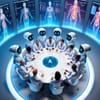A recent study published in the Proceedings of the National Academy of Sciences found that combining human expertise with AI models leads to the most accurate open-ended diagnoses. The research, conducted by an international team led by the Max Planck Institute for Human Development, analyzed over 40,000 diagnoses made by humans and machines in response to more than 2,100 realistic clinical vignettes.
The study discovered that hybrid diagnostic collectives, consisting of humans and AI systems, are significantly more accurate than collectives consisting solely of humans or AI. This is particularly true for complex, open-ended diagnostic questions with numerous possible solutions. The researchers attribute this success to the complementary strengths of humans and AI, which make different types of errors that cancel each other out.
According to the study's lead author, Nikolas Zöller, "Our results show that cooperation between humans and AI models has great potential to improve patient safety." The researchers emphasize that AI should be viewed as a complementary tool that unfolds its full potential in collective decision-making, rather than replacing human medical professionals.
The study's findings highlight the potential for greater patient safety and more equitable healthcare, especially in underserved regions. However, further research is needed to address the limitations of the study, including the potential risks of bias and discrimination by both AI and humans, and the practical implementation of AI-based support systems in real-world clinical settings.
The researchers see particular potential in regions where access to medical care is limited, and believe that hybrid human-AI collectives could make a crucial contribution to greater healthcare equity in such areas. The approach can also be transferred to other critical areas, such as the legal system, disaster response, or climate policy, where complex, high-risk decisions are needed.


